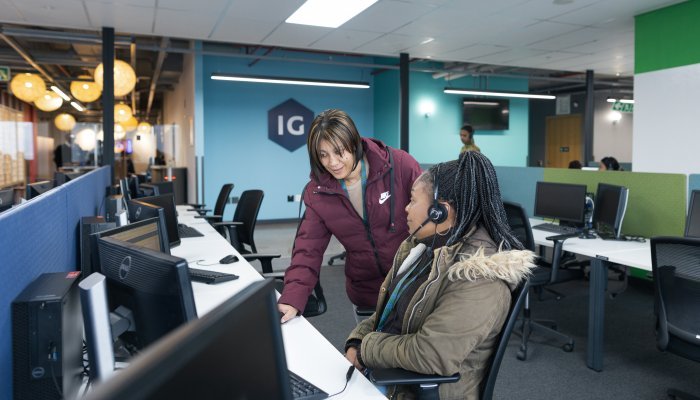With the South African economy in its current state, and with unemployment in the region of 32.6%, it’s always encouraging when an industry is booming, especially an industry with the potential to create not only revenue, but thousands of jobs as well.
The global business services (GBS) industry, of which customer experience (CX) is one specialisation, is currently this unicorn, already employing tens of thousands of South Africans in contact centres in Durban, Cape Town and Johannesburg, but it is the potential of the sector that is so exciting. At a recent BPESA global business services investor conference held in Umhlanga, which was attended by stakeholders from around the world that included service providers and clients in the industry, the consensus was that South Africa is currently the offshore destination of choice in the GBS world.
To get a better grounding in CX and how AI could possibly affect it, we asked Ryan Bayman, CEO of Durban-based Ignition CX, to explain firstly what the industry includes and why South Africa is the big buzzword at the moment.
“CX stands for customer experience – it’s the way a company engages with customers at every touchpoint and throughout the customer journey. So, sales and customer acquisition, customer service, customer care and customer retention, through channels like phone, digital engagements, email, chat, and social media,” explains Bayman.
And why is South Africa such an attractive offshore destination? South Africa is seen as a reliable, cost-effective, and high-quality place. Our famed national resilience means we keep delivering even in the face of adversity; our people have accents that appeal to customers in North America, Australia and the UK and are easy to understand; and we can provide excellent price points for exceptional value.
As you can imagine, the nature of an offshoring business means that it relies hugely on human capital and creates tens of thousands of jobs. Growth forecasts indicate that the industry has the potential to create more than 500 000 positions by 2030 in South Africa.
“It is estimated that globally there are approximately 17 million contact centre agent positions, so to capture 500 000 jobs is definitely possible,” says Bayman. “In 2022, the worldwide offshoring industry was conservatively estimated to be worth more than $250 billion, and South Africa accounted for only 1% of that. With the country’s current attractiveness, we think it is possible to grow this to 4% by 2030, which, based on the $250 billion figure, would increase the contribution to the local economy from $2.5 billion to $10 billion.”
As with every industry, the talk has recently shifted to artificial intelligence (AI) – not only the role it will play in future operationally, but also the affect it will have on jobs. Who hasn’t heard that “AI is coming for your jobs”?
Asked whether AI will negatively impact the job-creation forecast, Bayman is realistic but optimistic about the future.
“AI is obviously a hot topic at the moment in many of the conversations we have with our partners and with potential partners,” he says. “However, the market hasn’t reached a level of maturity yet in terms of understanding exactly what AI is and what it can do, and it is our responsibility to be at the forefront of technology and educate our partners. We need to be able to tell partners what AI capabilities exist, how they can add value and how we are the right partner for them and how we can use AI in their business solutions.”
So where does the future of AI lie in CX?
“We see it adding significant value is around back office and operational processes,” continues Bayman. “Where there are highly repetitive administration tasks that deal with massive numbers of data points, AI can automate processes. Here we can complete these tasks far more quickly and accurately, and at a lower cost than people. So there will be areas where it replaces a degree of human effort, but this also allows human capital to be freed up to do more interesting, complex tasks where human intuition is needed.”
“Ignition has been built predominantly on our expertise around high-performance sales acquisition, where we match customers with brands, and much of this is performance-based. We get paid when we deliver, so it’s important that we are at the forefront of the technology that helps us to do this well. We have a responsibility to be leveraging the best that AI has to offer in order to provide meaningful results to our clients.
“For example, we use AI to ensure that our sales agents are constantly supplied with information to get the best results. We use machine learning and data analytics to present potential customers with deals and opportunities that are relevant and meaningful to them, to increase conversions and improve customer satisfaction. So for a performance model like ours, AI will make our people more successful, but we don’t see it replacing them entirely. AI augments and facilitates what we’re capable of, and will continue to do so, and it will certainly make things more effective and efficient. But it’s an opportunity, not a threat.”
Daryl Firmani, IT director of Ignition CX, weighed in with a similar opinion. “AI is an opportunity that will enable an individual to do a higher level of work than they would be able to do on their own. By leveraging AI, we would, for example, be able to get one person to support 30 text-based interactions extremely well, instead of only being able to support 10 interactions at a time. Companies outsource CX work with the aim of reducing costs while ensuring expert management of customer interactions. If there’s an opportunity to achieve additional cost savings without compromising the quality of the work, companies are naturally inclined to explore it.”
“This may at face value look like AI could replace up to 70% of the workforce in the CX industry, but actually the demand and growth of the business means that we can utilise the additional workforce to service other campaigns and lines of business. We don’t look at AI as leading to the loss of jobs, but rather leading to a better experience for our partners’ clients and giving our staff the best tools to assist a customer in the most efficient and effective way. In a new product inquiry scenario, it involves aligning the client with the most suitable product and brand that precisely meets their requirements. Similarly, during a customer care call, it entails assisting with details related to their existing products and services.”
Firmani further explains how he sees AI being used, as well as some of the challenges AI faces.
“In the past, when we spoke of AI in our industry, we referred more to machine learning and data science functions for forecasting, prediction, analysis and other complex tasks. Today, if you ask someone about AI, they’re likely to mention tools such as ChatGPT. The definition of AI has shifted to encompass natural speech interpretation tools that listen, understand and provide well-researched answers.”
“Even with recent advances, there are still challenges with AI,” says Firmani. “For example, it’s only as good as the data it is trained on and has access to. Both the strength and the weakness of an AI language model is that it is trained on a huge amount of data – it has access to immense amounts of information, but there’s a high risk that some of it will be inaccurate. If it is trained on the entire internet, some of the data will be factually incorrect, contradictory, or opinion-based, and the result will be inaccurate or even misleading. You can ask ChatGPT a question and it will give you an answer, but users should be aware that because the model’s responses are based on patterns learned from data; it may not always provide fully reliable answers. These are commonly referred to as hallucinations.”
Firmani adds that AI tools need to be matched and outfitted for a business’ specific needs. “Achieving optimal performance in an AI-driven customer service system isn’t as straightforward as integrating a generic off-the-shelf AI program. To match the service quality provided by a well-trained CX expert, the AI system must undergo thorough training with specific data, and continuous review and monitoring are imperative to identify and address any shortcomings or hallucinations that may arise during the system's operation.
“In our approach to AI, we view it as a highly valuable tool for customer experience agents. In a live call environment, AI can provide agents with accurate prompts by actively listening to the conversation, identifying relevant information, and making it immediately available as the call unfolds. Then at the end of a call, the agent would get a quick summary of the conversation that can be saved to the call interaction to refer to later.
“An AI-driven QA (quality assurance) process of the call can also be displayed, letting the agent know they had done a great job or where they could improve. AI can provide positive reinforcement of well-handled calls and suggest corrective measures for poorly handled ones. It benefits everyone, and this is just one simple example of how AI and people can work together to deliver positive results for all.”
Concludes Firmani: “When I look at AI today and what it can do it improve our industry, I get excited. I’m excited to see the positive effect it will and has had on our staff, on the positive effect on customers when they call in or interact over chat.”
Bayman adds that “AI is an exciting opportunity, but we don’t see it taking over the CX world entirely. There will always be a critical role for people to play, and now we have to find the best way to harness the tools available and make people even better!”










